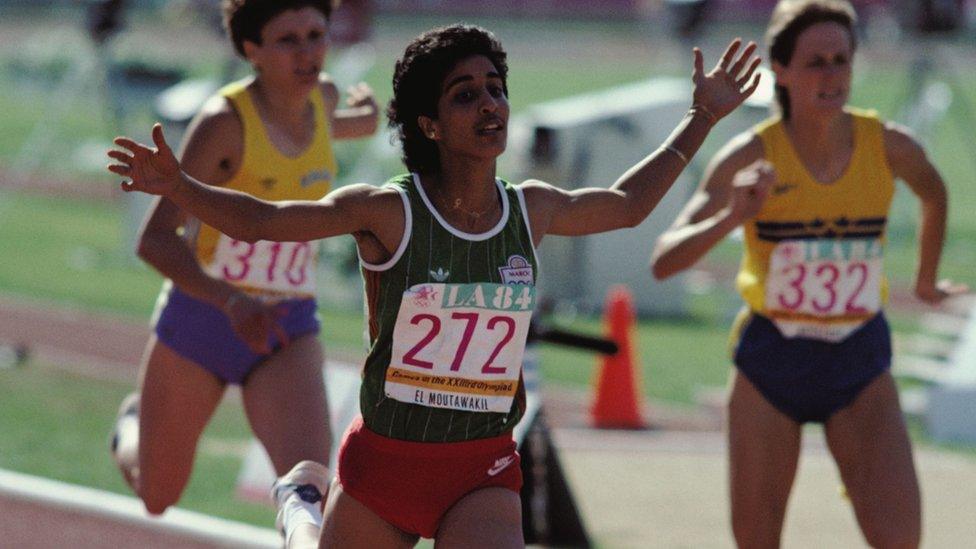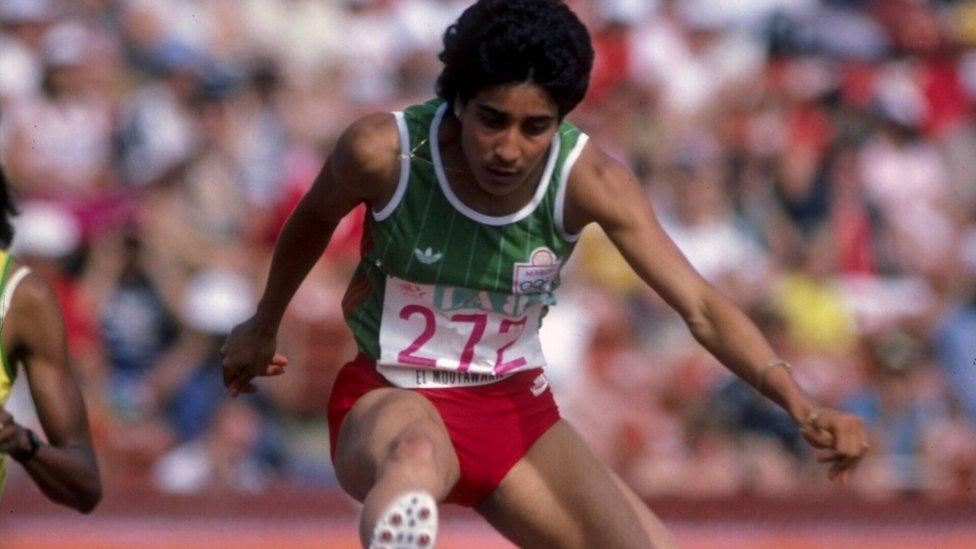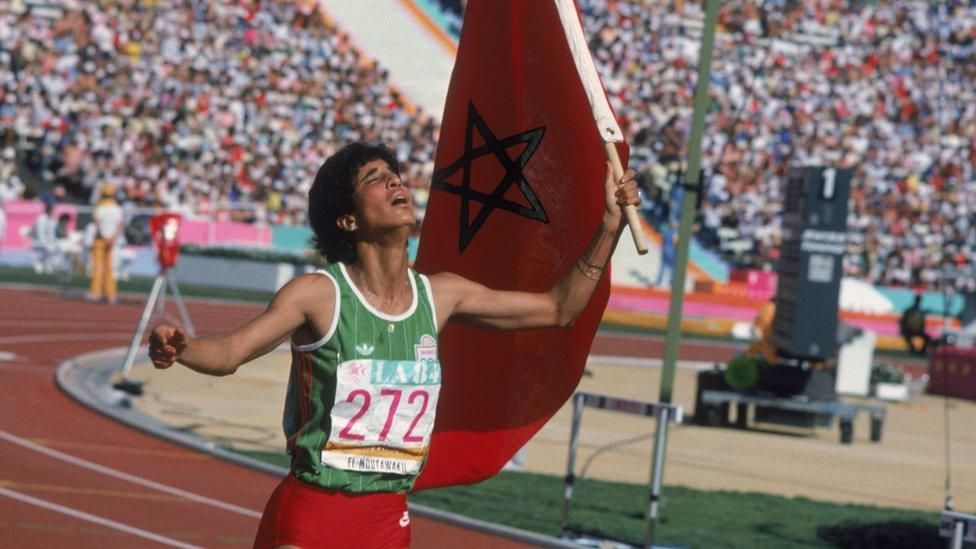Africa Olympic stories: Nawal El Moutawakel changes the Arab world in one run
- Published

El Moutawakel crossed the line so far ahead that she thought she had false started
If you are a Moroccan woman and have just turned 36 years old, you are almost certainly named Nawal. This is because the victory of Nawal El Moutawakel on 8 August 1984 at the Olympics in Los Angeles meant so much for the Moroccan King Hassan II that he declared that all the girls born on that day should be named after her. This is her story.
Every victory is special. But some, do resonate more than others, probably because they are the sum of many victories in one.
Such was the case with Nawal El Moutawakel’s performance at the 1984 Los Angeles Olympic Games.
She didn’t just become the first woman to win the 400m hurdles - the discipline only introduced for the first time for women at that Games - but she also became the first Moroccan to ever win a gold medal at the Olympics. Indeed, she was the only Moroccan woman there at all.
Perhaps this then inspired her compatriot Saïd Aouita who few days later doubled Morocco's success by winning the men's 5000m.
But what the world should always remember is that Nawal El Moutawakel was the first Arabic African woman to ever become an Olympic champion.
The night before the Final, El Moutawakel had nightmares of the race - such as falling in a hole after passing a hurdle.
"I was really scared," El Moutawakel recalls.
“I was the only female athlete in the all Moroccan delegation, and everybody was counting on me.
“I spent the entire night not sleeping, thinking about my race, looking at it in my dream, in my nightmares, because I was sweating, and I couldn’t go to bed, and I was looking at myself running in slow motion."
'This is your time'

El Moutawakel made history as the first winner of the women's 400m hurdles in the Olympics
Although she was not considered as one of the favourites, the Moroccan had learnt to trust in her own abilities and was determined to accomplish something in that race.
"I felt I could be in the finals, like top eight, but my coaches used to talk to me about believing stronger in myself and having a high self-esteem because they really thought I could win.
"Before the final, we sat down with my coaches and we would go over the tapes, not only to look at my race but every over runners like Judi Brown, PT Usha from India, Cojocaru from Romania, and we would go over all their strengths and weaknesses and also over my strengths and weaknesses.
"They said I had to go from start to finish very strong, because I could win."
Believing she could do it before actually accomplishing that performance was key to El Moutawakel's success.
Her mind was set, and she was now focused on one thing: “You have to leave from this country with something."
"This is your time, this is the city, this is the hour, you cannot miss it,” were some of the things she would tell herself.
With an American - her good friend, Judi Brown - in the race, the packed stadium was not rooting for the 22-year-old Moroccan. The atmosphere was tense and the media interest at its peak.
A false start - which El Moutawakel initially thought she had triggered - added to the tension.
When she realised it had not been her who had gone early, she refocused, and, at the second attempt, "took off like a bullet."
"First, second, third hurdles I jumped with the left leg, and then I continued alternating right and left until the finish line," she added. She was in a class of her own - so far ahead that she wondered if she had false started again and not heard the recall.
"I thought - 'where are the other ones, how come I am the only one running?'"
"But in fact, I was so much in the lead. And I started looking, before the finish line - I turned my head, left and right, to make sure I was not the only one running from start to finish. But they were there, all the other competitors."
Indeed, they were there - but way behind.
Bittersweet moment

El Moutawakel's triumph was a huge moment of Moroccan pride
Despite even slowing down at the last metres of her race, Nawal El Moutawakel smashed her personal best by more than a second to finish in 54.61 seconds, with Judi Brown taking silver in 55.20 seconds.
It was an amazing performance from Nawal El Moutawakel, although tinged with sadness as her first and best supporter was not there to witness it.
"It was a joy when I crossed the finish line - a real joy - but also a sadness, because my father, who was my number one supporter, had passed away few months before and he couldn’t witness my victory”, she said.
Coming from a family who loved sport - her dad was a former judoka and her mum a volleyball player - El Moutawakel had always been encouraged by her parents to pursue her dreams of becoming a top athlete. That’s how she was sent to the United States to progress in her career and at the same time studying.
But did they even imagine the impact their little girl would have worldwide through the sport and her achievement?
“For my country it was something really huge that nobody was expecting, a young Moroccan, a girl who tried to find a place among all these best athletes and not only to find a place but to win a gold and to bring it at home… it was something that will ever stay in every Moroccan's mind” said El Moutawakel.
"It was an historic moment that will forever stay in my mind and in my heart."
From there, a huge, a wide door opened up to many young girls, not just in Morocco but in many previously highly restrictive Arab and Muslims states.
“From that moment, we’ve seen many Moroccan women being world champions - and the same thing with Algeria, Tunisia, Egypt, Bahrain," she said.
"Countries whose women never attended Olympic Games. Afterwards, they were not attending to attend, but attending to win."